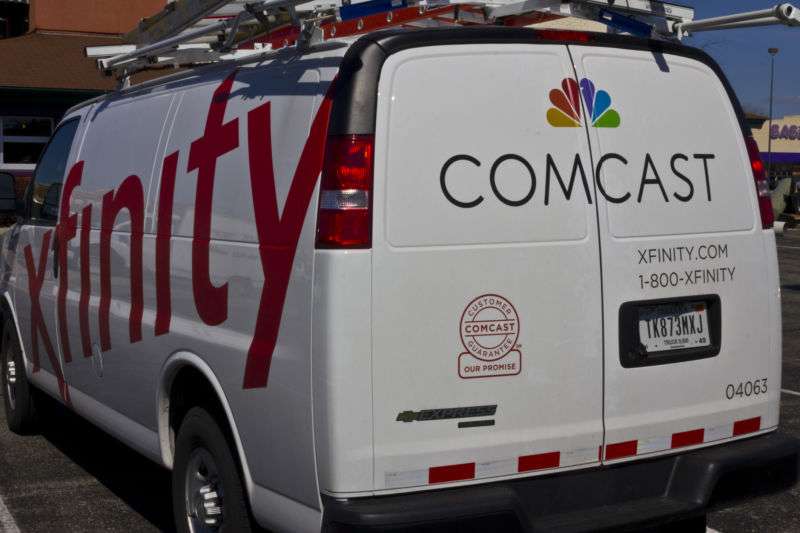
Sorry, Ajit: Comcast lowered cable investment despite net neutrality repeal

Comcast’s cable division spent 3 percent less on capital expenditures last year, despite promises that the repeal of net neutrality rules would boost broadband network investment.
Comcast’s cable division spent $7.95 billion on capital expenditures during calendar year 2017, but that fell to $7.72 billion in the 12 months ending on December 31, 2018.
“Cable Communications’ capital expenditures decreased 3.0 percent to $7.7 billion, reflecting decreased spending on customer premise equipment and support capital, partially offset by higher investment in scalable infrastructure and line extensions,” Comcast said in an earnings announcement today.
Comcast’s overall capital expenditures went up 2.3 percent, from $9.6 billion in 2017 to $9.8 billion in 2018. But that company-wide capital expenditure number includes the Comcast-owned NBCUniversal, which spent $1.7 billion in 2018, a 15.2 percent increase, “primarily reflecting investment at Theme Parks,” Comcast said.
The cable capital expenditure statistic thus provides a more accurate picture of whether Comcast increased or decreased investment in its broadband network. Cable capital expenditures as a percentage of Comcast’s cable revenue dropped from 15 percent in 2017 to 14 percent in 2018.
Comcast’s network spending should have risen in 2018 if predictions from Federal Communications Commission Chairman Ajit Pai and Comcast had been correct. Pai’s net neutrality repeal took effect in June 2018. But the vote to repeal net neutrality rules was in December 2017, and Pai claimed in February 2018 that the repeal was already causing increased broadband investment.
Broadband industry lobby group USTelecom also claimed that network investment grew in 2017 because of the anticipated net neutrality repeal and other deregulatory moves. In December 2017, Comcast said the net neutrality repeal would allow for “more competition in the marketplace and increased investment and innovation.”
Yet Comcast cable capital expenditures dropped year over year in each of the first three quarters of 2018. The expenditures did rise year over year in the fourth quarter, from $2.15 billion to $2.32 billion, but it wasn’t enough to offset the full-year decline.
The corporate tax cut implemented as 2018 began also didn’t stop job cuts at Comcast and AT&T, despite promises that the tax cut would create new jobs.
Charter and Verizon lowered investment, too
Comcast isn’t the only ISP that lowered network investment last year. Charter and Verizon both said in 2018 that they were reducing capital expenditures.
Charter and Comcast are both expected to reduce cable capital expenditures in 2019, according to MoffettNathanson estimates cited in a Light Reading article yesterday. Cable companies are planning upgrades to full duplex networks, but “the investment for that move will be incremental and is not expected to be anywhere near the level of spending that went into the initial DOCSIS 3.1 upgrades,” Light Reading wrote.
The FCC’s justification for repealing net neutrality rules was almost entirely based on Pai’s prediction that deregulation would cause network infrastructure spending to rise. That hasn’t happened with Comcast, the nation’s bigger home Internet provider.
Annual network spending isn’t necessarily a good indicator of whether broadband is expanding or getting better. Costs often go down as technology advances, after all. Network spending tends to be “lumpy,” rising and falling in conjunction with technology upgrade cycles. Wireless network spending is likely to increase going forward as carriers upgrade from 4G to 5G networks, but the 5G upgrade would happen regardless of whether net neutrality rules are in effect.
The net neutrality repeal hasn’t closed broadband gaps in rural areas, where industry trade groups say they won’t expand service unless the government gives them more direct funding. As the trade groups explained, the key factor is that ISPs won’t build in sparsely populated areas where they don’t expect to get a high return on investment.
The loss of net neutrality rules might help ISPs make more money in places where they already offer service. But the trade groups’ warnings about rural broadband suggest that the repeal wasn’t enough to make Pai’s prediction of “better, faster Internet access and more competition” come true.
Disclosure: The Advance/Newhouse Partnership, which owns 13 percent of Charter, is part of Advance Publications. Advance Publications owns Condé Nast, which owns Ars Technica.




